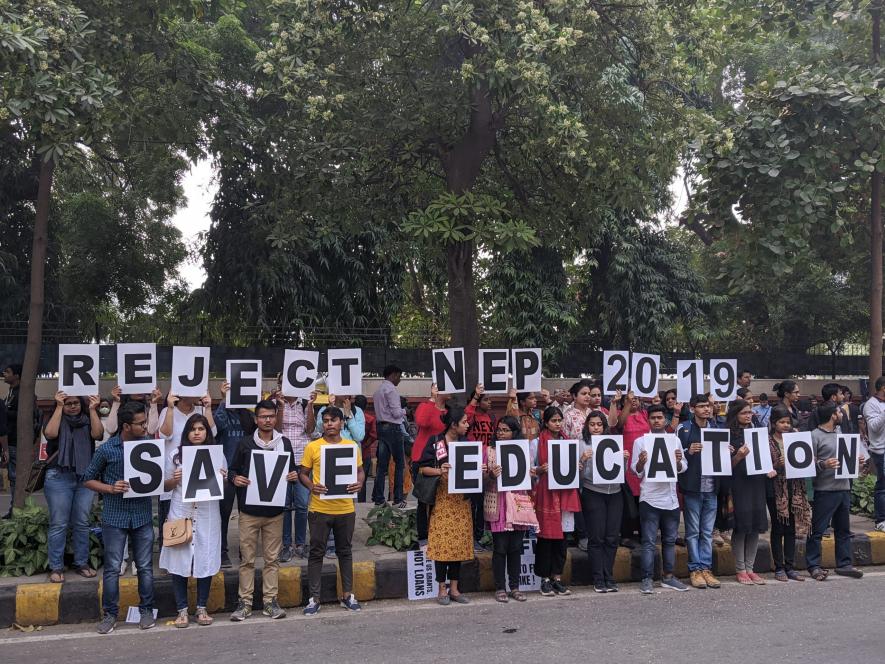NEP Makes Entry into JNU Amid Concerns and Protests

Representational Image. Image Courtesy: DU Beat
In its recently held 155th Academic Council meeting, the Jawaharlal Nehru University administration decided to go ahead with the implementation of several proposals of the New Education Policy. The proposals include the possibility of converting the existing three year BA Programs into four year programs with multiple entry and exit points, starting new four year undergraduate programs and offering master’s level programs in online mode on subjects which do not require lab or experimental work. The proposals have caused a stir among the students and teachers whereas the administration appears to be ready with its action programme for the university.
So, what does the new policy bring in for one of the most prestigious universities in India known for its research.
NewsClick spoke to Pramod Kumar, Registrar, Jawaharlal Nehru University, who shared his version about implementing the policy and the changes it could bring for governance in the university. Responding to the question of reforms the new policy will bring, Kumar said, "It is not about some reforms. We want to implement the entire policy. As far as changes are concerned, we are seeking the introduction of new four year undergraduate programs along with the possibility of converting existing three year programs into four year programs with multiple entry and exit points so that a student can flexibly choose his career options. Suppose, a student decides to enrol himself into BSc (Physics) and a year later moves into Engineering, he will not have to drop out. He can exit with a year certificate and later join it.”
The New Education Policy advocates funding under a new body, Higher Education Grants Council. However, the institutions have been asked to raise private funds to introduce new courses. Kumar believes that the funding of the university will hardly be affected. He said, "I do not see much change. We are still getting loans from the Higher Education Financing Agency. There is much hype around the loans under the new regime. I mean you cannot entirely depend on government’s funds to run the institutions. You should at least pay one per cent back to it.”
Further, refuting the claims of distress caused by the digital divide and proposal to offer online classes for MA courses, Kumar said, "It’s a corrupt idea to say that rural areas in the country have internet connectivity issues. I hail from a village in Bihar and I receive WhatsApp messages easily. There is no substance in these questions.”
However, the university teachers and students hold a different view about the implementation of the new education policy. Mousumi Basu, former Executive Council member and secretary of the JNU Teachers’ Association suggests that the university went ahead with implementing the proposals of the policy without trying to reach any consensus. Talking to NewsClick, she said, "I think the university has already started implementing some of the proposals. First, they de-linked the MPhil and PhD programs. Now, we are hearing about the removal of MPhil program altogether. There is much anxiety among the teachers and students, too, about the online mode of teaching. We resorted to online teaching out of compulsion during the pandemic and not as a de facto method.”
Basu believes that the new governance model brought forth under the policy could have a tolling effect on the university’s autonomy and it could make it more gullible to the decisions taken by the government. Introducing new governance methods under the Board of Governors, the policy denotes, ”Through a suitable system of graded accreditation and graded autonomy, and in a phased manner over a period of 15 years, all HEIs in India will aim to become independent self-governing institutions pursuing innovation and excellence. Measures will be taken at all HEIs to ensure leadership of the highest quality and promote an institutional culture of excellence. Upon receiving the appropriate graded accreditations that deem the institution ready for such a move, a Board of Governors (BoG) shall be established consisting of a group of highly qualified, competent, and dedicated individuals having proven capabilities and a strong sense of commitment to the institution. The BoG of an institution will be empowered to govern the institution free of any external interference, make all appointments including that of head of the institution, and take all decisions regarding governance.”
Basu added, "Earlier, the decisions regarding courses were taken first at the centres to be later brought at the academic council and finally forwarded to the Board of Studies for final approval. Now, much of the decisions are taken by the Vice Chancellor bulldozing over the faculties. A prime example is the introduction of Ayurveda Biology in the School of Sanskrit and Indic Studies. The course was introduced earlier and later brought for the approval of the Academic Council. This top down approach, I think, will continue under the Board of Governors and in the long run harm the university.”
Miffed over the proposal of generation of revenue by the university, a worried Basu said that universities are not meant to earn income and if they are told to do so, it will deeply affect the diversity of students. She said, "Currently, the university follows three different fee models where normal students in social sciences and other courses pay Rs 283, engineering students pay Rs 60,000 and management students pay Rs 12,00,000 per annum respectively. In this scenario, if one seeks to increase the revenue, it will come through cuts in expenditure. Ironically, we saw significant fund cuts in scholarships and library expenses. We have also witnessed a situation when the entire funds from the proceeds of HEFA were diverted for constructing the building of engineering and management schools. In any way, I am not seeing the diversity of students for which the university was known. We saw students from the remotest part of the country who were first generation learners and could write their papers in their mother tongues. Now, we have multiple choice question papers in English only. We all know who has access to English medium education in this country.”
Similar concerns came from the students community, who were up in arms against the fee hike last year. Talking to NewsClick, Aishe Ghosh, president of the JNU Students' Union, said that the new policy would hamper the academic quality and produce students with little understanding of their subjects. She said, "Our first reservation is regarding the way the policy advises to curb the instances of dropout. It has given multiple entry and exit points. So, a student exits the course after two years to get a job, he will still have an immature understanding of his subject. So, we are actually not finding the reason and giving them a caring hand to complete their studies. The policy is giving them early exit options. That’s it.”
She added, ”Another concern that I believe is over the insistence on online education whereas we saw multiple complaints over the access to classes. Seventy per cent students do not have enough space to attend their classes properly at home. Class room teaching brought together students from diverse backgrounds who could learn from their experiences. We learned about caste discrimination and gender inequality in the class more than any text book. NEP reverses it and proposes a mechanical education.”
Get the latest reports & analysis with people's perspective on Protests, movements & deep analytical videos, discussions of the current affairs in your Telegram app. Subscribe to NewsClick's Telegram channel & get Real-Time updates on stories, as they get published on our website.
























